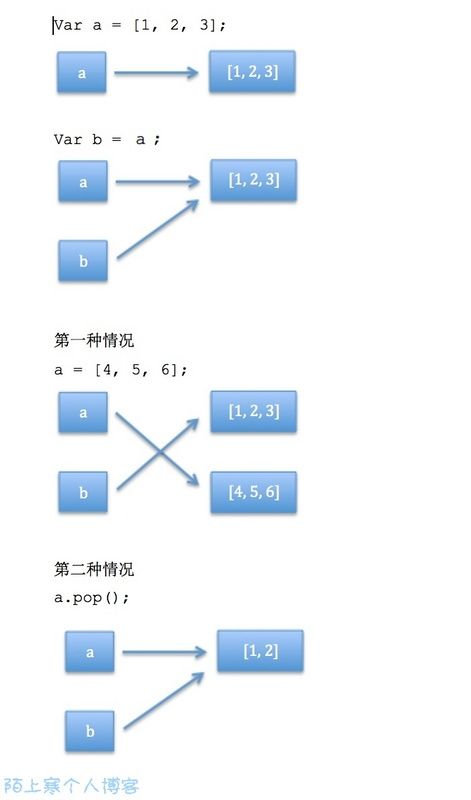在上一篇文章中JavaScript中AMD和ES6模块的导入导出对比,偏向于理论层面,还有一些同学在微信群里或是私下里针对一些问题进行了沟通,所以有了这一篇文章,对js的导入导出进行总结和实践
当直接给 module.exports时,exports会失效
这个问题其实已经和导入导出没什么关系了,
我们看一个知乎上的问题(详细地址阅读原文可以查看)
我们以此为突破点
js 数组赋值问题 :值传递还是引用?
var a = [1,2,3];
var b = a;
a = [4,5,6];
console.log(b); //=>[1,2,3]继续看
var a = [1,2,3];
var b = a;
a.pop();
console.log(b); //=>[1,2]为什么会出现这种情况?
数组和对象的赋值操作都是引用传递
看下这个(留意注释部分)
var a = [1,2,3];// a指向了数组 [1,2,3];
var b = a;//b 指向 a 所指向的数组[1,2,3];
a = [4,5,6];//a 指向了新的数组 [4,5,6],(a的指向发生了变化,改变的是a引用本身,没有改变数组对象,所以b没有变)
console.log(b); //b没有改变,还是指向数组 [1,2,3];再看下这个(留意注释部分)
var a = [1,2,3];// a指向了数组 [1,2,3];
var b = a;//b 指向 a 所指向的数组[1,2,3];
a.pop();// a 指向的数组实例发生了 pop 操作
console.log(b); //=>a和b都是指向同一个数组,a变量,所以b也变量,最后输出=>[1,2]看一张图片,很形象的描述
数组如此,对象也是大同小异
看一个群友@ZSing提供的demo
var test = {
"name": "zhangshuo"
}
var demo = test;
demo.name = "want you"
//你认为test是什么?
console.log(test)//=>{ name: 'want you' }下面通过注释解释一下(如出一辙)
var test = { "name": "zhangshuo"}//test指向了一个对象 { "name": "zhangshuo"}
var demo = test;//demo 指向 test 所指向的对象 { "name": "zhangshuo"}
demo.name = "want you"//对象的属性发生了改变 { "name": "want you"}
//你认为test是什么?
console.log(test)//=>{ name: 'want you' }test和demo指向了同一个对象,一个变了,就都变了
同样的,我们对上面的demo做一下改造
var test = {
"name": "zhangshuo"
}
var demo = test;
test={
"name": "更改了这个name"
}
demo.name = "want you"
//你认为test是什么?
console.log(test)//=>{ name: '更改了这个name' }还需要对此进行赘述吗?
还是通过注释对此进行解释说明
var test = { "name": "zhangshuo"}//test指向了一个对象 { "name": "zhangshuo"}
var demo = test;//demo 指向 test 所指向的对象 { "name": "zhangshuo"}
test={ "name": "更改了这个name" }//test的指向发生了变化,指向了一个新对象{ "name": "更改了这个name" }
demo.name = "want you"//demo的指向没有变,改变了原对象的属性 { "name": "want you"}
//你认为test是什么?
console.log(test)//=>{ name: '更改了这个name' }我相信,上面的两个栗子你已经看懂了,即将进入正题
先来一个过渡
再看一个栗子,用来模拟exports和 module.exports的关联关系
let md = {exps:{}}//md指向一个对象 {exps:{}}
let exps = md.exps//exps指向了md.exps所指向的对象 ,这个空对象{}
md.exps = {a: 1, b: 2}//md.exps指向了一个新对象 {a: 1, b: 2}
exps.c=3//exps,属性赋值 {c: 3}
console.log(md.exps); //新对象{ a: 1, b: 2 }上面栗子中的md就是module,md.exps就是module.exports,exps就是exports
在每一个模块的头部都有一行这样的命令
var exports = module.exports;当直接给module.exports赋值时(module.exports={.....}),module.exports就指向了一个新对象,exports会失效
直接给exports赋值会切断exports和 module.exports的关联关系
还是这样的一个前提
var exports = module.exports;exports是来自于module,exports指向 module.exports所指向的对象
当直接给exports赋值,即
exports = {a:1}exports指向了一个新对象,不再是 module.exports所指向的对象,所以不要给 exports 直接赋值( exports =。。。)
实践=>导出
exports
exports的output.js
exports.str='string字符串'//导出字符串
exports.bool=true//导出布尔
exports.num=123//导出number
exports.foo=(r)=>{//导出函数
console.log(`导出函数为:${r}`);
}
exports.arr=[1,2,3]//导出数组
exports.obj={ a:1, b:2}//导出对象input.js
const iptObj= require('./output.js')
console.log(iptObj.str);//=>string字符串
console.log(iptObj.bool);//=>true
console.log(iptObj.num);//=>123
console.log(iptObj.arr);//=>[ 1, 2, 3 ]
console.log(iptObj.obj);//=>{ a: 1, b: 2 }
iptObj.foo('参数')//=>导出函数为:参数module.exports
module.exports的output.js
module.exports={
str:'string字符串',
bool:true,
num:123,
foo:(r)=>{
console.log(`导出函数为:${r}`);
},
arr:[1,2,3],
obj:{ a:1, b:2}
}input.js
const iptObj= require('./output.js')
console.log(iptObj.str);//=>string字符串
console.log(iptObj.bool);//=>true
console.log(iptObj.num);//=>123
console.log(iptObj.arr);//=>[ 1, 2, 3 ]
console.log(iptObj.obj);//=>{ a: 1, b: 2 }
iptObj.foo('参数')//=>导出函数为:参数module.exports的output.js同时支持如下写法
module.exports.str='string字符串'
module.exports.bool=true
module.exports.num=123
module.exports.foo=(r)=>{
console.log(`导出函数为:${r}`);
}
module.exports.arr=[1,2,3]
module.exports.obj={ a:1, b:2}input.js不变
export
export的output.js
export const srt = 'string字符串'
export const bool = true
export const num = 123
export const arr = [1, 2, 3]
export const obj = { a: 1, b: 2}
export function foo(r) {
console.log(`导出函数为:${r}`);
}input.js
import {str,arr,obj,bool,num,foo} from './output'
console.log(str)
console.log(arr)
console.log(obj)
console.log(bool)
console.log(num)
foo('参数')export的output.js同时支持如下写法
const str = 'string字符串'
const bool = true
const num = 123
const arr = [1, 2, 3]
const obj = { a: 1, b: 2}
function foo(r) {
console.log(`导出函数为:${r}`);
}
export {
str,bool,num,arr,obj,foo
}input.js 导入支持重命名
import {str as STR,arr,obj,bool,num,foo as FOO} from './output'
console.log(STR)
console.log(arr)
console.log(obj)
console.log(bool)
console.log(num)
FOO('参数')继续重命名
import * as newName from './output'
console.log(newName.str)
console.log(newName.arr)
console.log(newName.obj)
console.log(newName.bool)
console.log(newName.num)
newName.foo('参数')export default
export default的output.js
export default {
str: 'string字符串',
bool: true,
num: 123,
foo: (r) => {
console.log(`导出函数为:${r}`);
},
arr: [1, 2, 3],
obj: { a: 1, b: 2 }
}input.js
import defaultObj from './output'
console.log(defaultObj.str)
console.log(defaultObj.arr)
console.log(defaultObj.bool)
console.log(defaultObj.num)
console.log(defaultObj.obj)
defaultObj.foo('ef')//=>导出函数为:efexport default的output.js同时支持如下写法
const str = 'string字符串'
const bool = true
const num = 123
const arr = [1, 2, 3]
const obj = {a: 1, b: 2}
function foo(r) {
console.log(`导出函数为:${r}`);
}
export default {
str,
bool,
num,
arr,
obj,
foo
}input.js不变
总结
这篇文章是对上一篇文章的总结和实践
- 当直接给 module.exports时,exports会失效
- 直接给exports赋值会切断exports和 module.exports的关联关系
- export,export default,exports,module.exports具体的使用方法实例
更多前端资源请关注微信公众号“前端陌上寒”